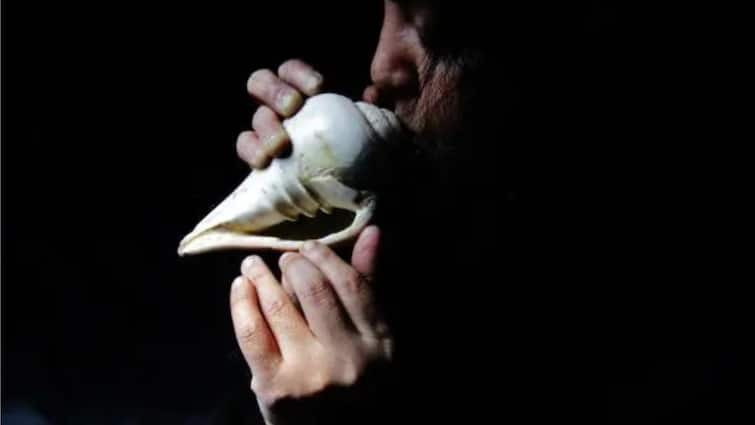A small but striking new trial from Jaipur suggests that an ancient Indian breathing practice, viz. that of blowing through a conch shell or shankh, may ease symptoms of moderate obstructive sleep apnoea (OSA).
The study’s findings have been published in the European Respiratory Journal and also by the News Medical Lifesciences. “Efficacy of blowing shankh on moderate sleep apnea (a randomised control trial)” claims the ERJ Open Research findings.
According to the study, over six months, adults aged 19-65 who practiced shankh blowing for 15 minutes a day, five days a week, reported 34% less daytime sleepiness, better sleep quality, and experienced about four to five fewer apnoea events per hour compared to those doing a standard deep-breathing exercise.
With fewer breathing interruptions at night and higher overnight oxygen levels, the study offers a promising, low-cost alternative (or adjunct) to machines or medications—though experts caution larger trials are needed.
While the trial from Jaipur highlights intriguing benefits of this ancient practice, medical experts stress that more evidence is needed before shankh blowing can be considered a reliable treatment for sleep apnoea. To understand how it actually works in the body, who might benefit, and where caution is advised, we spoke to Dr. Saurabh Pahuja, Senior Consultant in Sleep Medicine and Pulmonology at Amrita Hospital, Faridabad. Here’s what he told ABP Live.
ABP Live: Which parts of the body, muscles, airways, or tissues, are engaged during conch shell blowing, and why is this important for sleep apnoea?
Dr. Saurabh Pahuja: Blowing a conch shell is not just a symbol; it requires physical effort. It uses the respiratory muscles, especially the diaphragm, intercostal muscles, and muscles in the upper airway, like those in the soft palate, tongue, and pharyngeal walls. These muscles often collapse during obstructive sleep apnoea (OSA). By exercising them regularly, conch blowing may strengthen airway tone, which could help reduce airway collapse during sleep.
ABP Live: Can shankh blowing meaningfully ease symptoms of OSA, or should it be seen mainly as a supportive practice alongside CPAP or other therapies?
Dr. Saurabh Pahuja: Currently, conch blowing should be considered a supportive practice. There is little clinical evidence that it can replace established treatments like CPAP (Continuous Positive Airway Pressure) therapy, oral appliances, or weight management. However, as a non-invasive exercise, it may help improve lung capacity, airway stability, and overall breathing control. It is similar to yoga-based breathing exercises, which have been beneficial for OSA patients: helpful as an addition, but not a cure.
ABP Live: Are there any risks or health conditions where conch blowing may be unsafe or counterproductive?
Dr. Saurabh Pahuja: Yes, caution is important. People with uncontrolled high blood pressure, hernias, serious heart conditions, or recent surgeries should avoid forceful conch blowing, as this practice increases pressure in the chest and can put stress on the heart. Patients with dizziness, vertigo, or severe lung disease may also find it uncomfortable. It is crucial to talk to a doctor before trying this.
ABP Live: What simple dos and don’ts should patients keep in mind if they want to try this practice at home?
Dr. Saurabh Pahuja: Here are some precautions to take:
- Do start gently, with short sessions, and gradually build strength.
- Do practice while sitting to avoid strain.
- Do keep the conch clean to prevent infections.
- Don’t hold your breath for too long—this may lead to dizziness.
- Don’t use this in place of prescribed OSA treatments; treat it as a supplement.
ABP Live: In the bigger picture, how do you see traditional breathing practices like shankh blowing fitting into modern sleep medicine?
Dr. Saurabh Pahuja: Modern sleep medicine is increasingly recognizing the value of non-drug, lifestyle-based practices. Just like yoga and pranayama have shown benefits for sleep and breathing health, conch shell blowing is part of India’s longstanding tradition of breathing exercises. While it cannot replace the best established therapies, it serves as an important link between traditional wellness and modern medical approaches. With more clinical studies, we may find effective ways to incorporate such practices into comprehensive care for sleep apnoea.
Check out below Health Tools-
Calculate The Age Through Age Calculator



